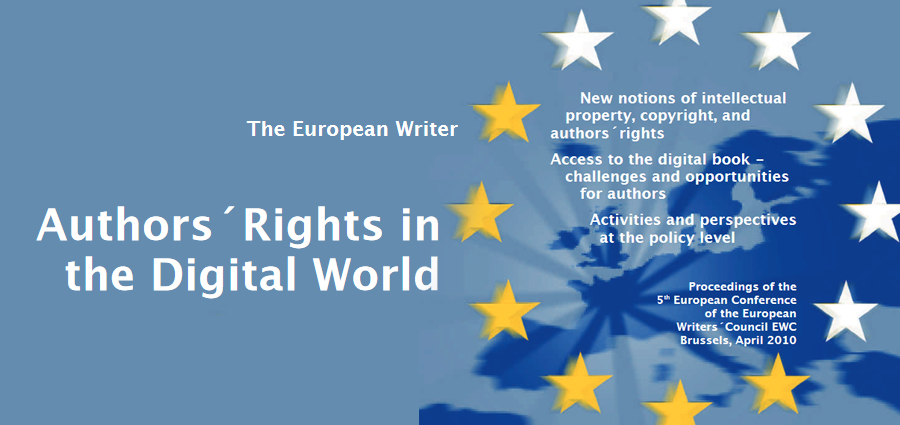Authors’ Rights in the Digital World
Main themes:
• New notions of intellectual property, copyright, and authors’ rights
• Access to the digital book – challenges and opportunities for authors
• Activities and perspectives at the policy level
Introduction
There are three concepts that are of great value for us: author, literature and author’s rights. In the last years, there has been a strong tendency to replace these with competing concepts: content producer, digital publishing (or e-book etc.) and consumers’ rights.
Author is a creative person. She or he needs time to write – create – her or his works. Authors are professional and often specialized writers who develop their skills. They are not – and they should not be – starving romantic caricatures with their painful inspirations.
Authors are the pillars of the knowledge-based society. We need people who can dedicate their time and competence in story-telling and exposing knowledge. Without authors there would not be novels and escapism, descriptions of alternative realities, debate books and social criticism, analysis of reality, research and education. Neither would there be translations. Authors are responsible for their work. They deserve good working conditions and fair remuneration. The utterance “content-producer” is pejorative. It changes the professional writers to workers in the industrial chain.
Literature is much more than the platform or the concrete object which carries the text. Platforms have change and they keep changing, from papyrus to paper and to digital documents. The way of writing and producing the books or copies may change but that does not change the value of the work.
Literature is a large phenomenon, essential to all communities. It tells our past and it makes our future. It changes our attitudes and gives us fresh knowledge. There are several genres and several ways to create works and several functions that literature serves. As individuals, we can develop ourselves by means of the whole cultural heritage that is built on books and literature. The same is true of communities and societies.
Authors’ rights are for authors.They make it possible to create new works and disseminate the works to the benefit of the humankind. If we forget authors’ rights and underline only the readers’ – or with the contemporary jargon: consumers’ – access, we might harm the welfare and growth of the whole culture. Who would write new books? So, the authors’ rights are for readers, too.
The world is changing. We are facing technology that we could not imagine some years or decades ago. We can see new literary genres and new ways to use the language. Ways of writing and procedures of publishing are rapidly changing. And so on. All we can see, is the change and acceleration of changes.
The change is not the whole truth. Much is as before: the exquisite- ness of books and reading, the flow of ideas and literature that makes the world rich, and the work of authors that needs to be guaranteed and protected.
I wish you all a rich and fruitful conference!
Pirjo Hiidenmaa, EWC President (2010)
AGENDA – Table of Content
Welcome by:
Helga Trüpel, host, Member of the European Parliament, Vice-Chairwoman, Committee on Culture and Education
Pirjo Hiidenmaa, EWC President
Vladimir Šucha, Director, Directorate Culture and Communication, DG Education and Culture European Commission
Keynote: Dulce Maria Cardoso, Winner of the 2009 EU Literary Prize for Portugal
Panel 1
New notions of “intellectual property”, copyright and authors’ rights Copyright and the Digital – New ways of creating and publishing – Alternatives to piracy – Consumers’ and authors’ needs.
Moderator/Rapporteur: Nicole Pfister-Fetz, Autorinnen und Autoren der Schweiz – AdS, Switzerland; Dr. Lucie Guibault, Institute for Information Law, University of Amsterdam, The Netherlands; Alain Absire, novelist, President of the Société des Gens de Lettres – SGDL, France; Hanna Harvima, Policy Officer – UNI MEI, Brussels; Oliver Money-Kyrle, Assistant General Secretary, European Federation of Journalists – IFJ/EFJ
Panel 2
Access to the digital book: Challenges and opportunities for authors Digital libraries – New business models – An enhanced role for collecting societies
Moderator/Rapporteur: Trond Andreassen, author, General Secretary, The Norwegian Non-fiction Writers and Translators Association, former EWC president, Norway; Rainer Just, VG Wort, Germany; Carola Streul, Secretary-General, European Visual Artists – EVA, Brussels; Mette Møller, Attorney-at-law, General Secretary, Norwegian Authors’ Union – DnF,
Norway; Lidia Joanna Geringer de Oedenberg, Poland, Member of the European Parliament, S&D, Committee on Legal Affairs; Tilman Lüder, Head of Unit, Copyright, DG Internal Market and Services, European Commission
Panel 3
Activities and perspectives at the policy level.
The creators’ indispensable role and contribution to the development of Europe’s educational systems and the knowledge-based economy – Creative industries and creators ́ rights – European policies to ensure the survival of creators and creativity
Moderator/Rapporteur: Pirjo Hiidenmaa; Prof. Dr. Matthias Leistner, Chair in Intellectual Property and Competition Law, University of Bonn, Germany; Maureen Duffy, novelist, former EWC President, United Kingdom; Xavier Troussard, Head of Unit, Culture Policy and Intercultural Dialogue, Directorat-General for Education and Culture, European Commission
Conclusion
Conclusions & Recommendations to the European Union Institutions
Rapporteurs: Nicole Pfister-Fetz, Trond Andreassen and Pirjo Hiidenmaa.
Concluding Remarks
Helga Trüpel
We gratefully acknowledge the patronage of MEP Helga Trüpel, and the support granted by the Group of the Greens/European Free Alliance, as well as by the European Commission DG EAC.
Proceedings of the 5th European Conference of the European Writers ́Council EWC Brussels, April 2010. Organized by The European Writers ́Council EWC Anna Dünnebier, Vice-President, Myriam Diocaretz, Secretary-General.
The Proceedings of the 5th European Conference organised by the European Writers’ Council, and held in April 2010 at the European Parliament (Brussels) under the patronage of MEP Helga Trüpel, Group of the Greens/European Free Alliance, are available in digital form:

